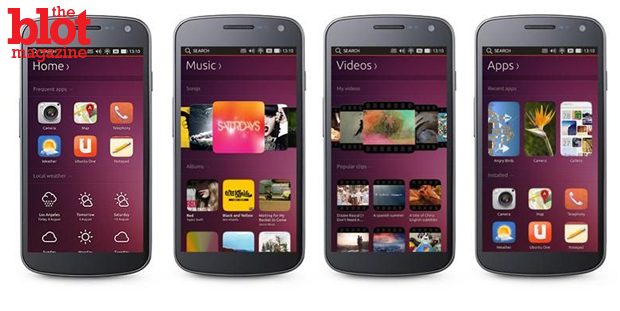
Cards on the table up front for this column. I am a user of Linux on my computers. The operating systems offered by Microsoft and Apple are, at best, B- software, and at worst, they are Windows Vista. Linux, written and given to the world by Linus Torvald, is a variety of free software that can get your computer to do whatever you want, and did I mention it’s free? It doesn’t get viruses (you’d have to deliberately try to infect your machine to get one), and it is incredibly stable. It loads much faster than MS or Apple operating systems, and in the unlikely event no one has developed a Linux version of a program, you can run a Microsoft version under an emulator. Did I mention it’s free? Only a mug buys software.
Ubuntu Linux is the most popular of the numerous Linux distributions (“distros” are just different flavors of Linux, homebrew versions that circulate on the Internet), and the company that develops it, Canonical, has announced it is going into the smartphone business to take on the iPhone and Android (which is derived from Linux anyway). If things go according to plan, Canonical is going to change the way your smartphone works. How? No more apps. Instead, you’ll get Scopes, and you’re going to love them.
“We’re producing an experience where content and services come directly to the screen in an unfragmented way,” Cristian Parrino, vice president of mobile at Canonical, said in an interview with Fast Company. “It makes for a much richer and faster user experience.”
Suppose for a moment that you are in desperate need of music. Under the app grid regime we have today, your thinking goes, “Maybe I should fire up Grooveshark and listen to ‘AM’ by Arctic Monkeys.” Under Scopes, the thought process is, “Today calls for ‘AM,’ definitely.”
Scopes are contextual home-screen dashboards, making them simpler and easier to develop than a native app. Related content from different providers shows up side by side. “AM” might play from Grooveshark or Rdio if you prefer, or if it’s on your device itself, it could play from there. The point is you don’t care or have to care. You want the songs. Another Scope might show reviews of the album from Time Out along with related suggestions from Yelp. All of this is on the same screen.
“Scopes can be developed for a fraction of the cost of a traditional app,” says Parrino. “They also have the benefit of being integrated to the phone’s core experience.” He also said, “The experiences Android and iOS are delivering have been pretty much the same since the first iPhone came out. People are craving for something new.”
Now, it’s true that you can do all of this with custom skins or some seriously heavy widget operations in Android, but by the time you have fiddled around with all of that, it’s time for a device upgrade anyway.
Jim Martin at PC Advisor in the U.K. wrote, “One of the big differences between Ubuntu phone and Android, iOS and other mobile operating systems is that it’s designed to work like a desktop OS when connected to a big screen. Instead of mirroring the screen when you plug in an HDMI cable, you’ll dock your phone with a monitor, keyboard and mouse and get a mouse pointer so you can use the OS like Ubuntu on a PC or laptop.” In other words, it’s a grown-up computer, too.
OK, so ready for the bad news? You can only buy them in Europe right now. Canoncial is using the BQ Aquaris E4.5 Ubuntu Edition as a proof of concept, and so, they are selling it in Europe where carriers are cool with you swapping out SIM cards to give something new a whirl (write your Congressman!).
Jeff Myhre is a contributing journalist for TheBlot Magazine.






One Comment
Leave a Reply